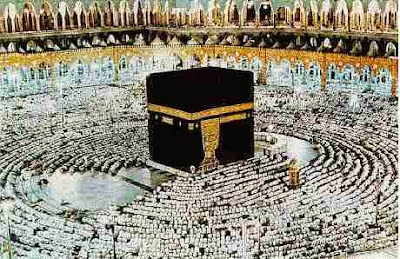The hajj, or pilgrimage to Mecca, a central duty
of Islam whose origins date back to the Prophet Abraham, brings together
Muslims of all races and tongues for one of life’s most moving spiritual
experiences.
For 14 centuries,
countless millions of Muslims, men and
women from the four corners of the earth, have made the pilgrimage to
Mecca, the birthplace of Islam. In carrying out this obligation, they
fulfill one of the
five “pillars” of Islam, or central religious duties of the believer.
Muslims trace the recorded origins of the divinely
prescribed pilgrimage to the Prophet Abraham. According to the Quran, it was
Abraham who, together with Ishmael built the Kabah, “the House of God”, the direction
toward which Muslims turn in their worship five times each day. It was
Abraham, too who established the rituals of the hajj, which recall
events or practices in his life and that of Hagar and their son Ishmael.
In the chapter entitled “The Pilgrimage”, the Quran
speaks of the divine command to perform the hajj and prophesies the
permanence of this institution:
“And when We assigned for Abraham the place of the House, saying ‘Do not associate Anything with Me, and purify My House for those who go around it and for those who stand and bow and prostrate themselves in worship. And proclaim the Pilgrimage among humankind: They will come to you on foot and on every camel made lean By traveling deep, distant ravines.’” (Quran 22:26-27)
By the time the Prophet Muhammad, may the mercy and
blessings of God be upon him, received the divine call, however, pagan
practices had come to muddy some of the original observances of the hajj.
The Prophet, as ordained by God, continued the Abrahamic hajj after
restoring its rituals to their original purity.
Furthermore, Muhammad himself instructed the believers
rituals of the hajj. He did this in two ways: by his own
practice, or by approving the practices of his Companions. This added some complexity
to the rituals, but also provided increased flexibility in carrying them out,
much to the benefit of pilgrims ever since. It is lawful, for instance, to
have some variation in the order in which the several rites are carried out,
because the Prophet himself is recorded as having approved such actions. Thus,
the rites of the hajj are elaborate, numerous and varied; aspects of
some of them are highlighted below.
The hajj to Mecca is a once-in-a-lifetime
obligation upon male and female adults whose health and means permit it, or, in
the words of the Quran, upon “those who can make their way there.” It is not
an obligation on children, though some children do accompany their parents on
this journey.
Before setting out, a pilgrim should redress all wrongs,
pay all debts, plan to have enough funds for his own journey and for the
maintenance of his family while he is away, and prepare himself for good
conduct throughout the hajj.
When pilgrims undertake the hajj journey, they
follow in the footsteps of millions before them. Nowadays hundreds of
thousands of believers from over 70 nations arrive in the Mecca by road, sea
and air every year, completing a journey now much shorter and in some ways less
arduous than it often was in the past.
Tags:
Hajj

